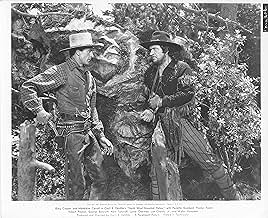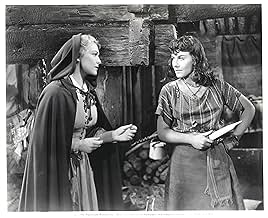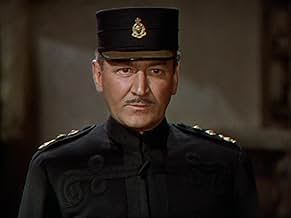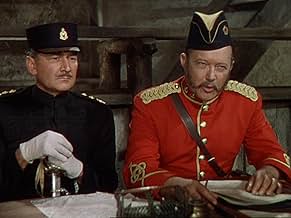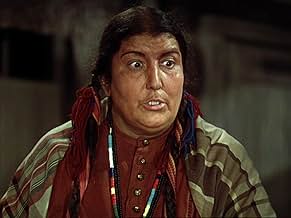CALIFICACIÓN DE IMDb
6.3/10
1.9 k
TU CALIFICACIÓN
En 1885, un ranger de Texas viaja a Canadá para arrestar a un cazador buscado por asesinato y que está incitando a los nativos a una rebelión contra el gobierno canadiense.En 1885, un ranger de Texas viaja a Canadá para arrestar a un cazador buscado por asesinato y que está incitando a los nativos a una rebelión contra el gobierno canadiense.En 1885, un ranger de Texas viaja a Canadá para arrestar a un cazador buscado por asesinato y que está incitando a los nativos a una rebelión contra el gobierno canadiense.
- Dirección
- Guionistas
- Elenco
- Ganó 1 premio Óscar
- 4 premios ganados y 4 nominaciones en total
Opiniones destacadas
The master of spectacle doesn't let us down in that regard with his first movie shot in Technicolor.The action sequences are as exciting as in other De Mille spectacles but the hammy acting,the ridiculous dialog and slow pacing makes this a below par movie for De Mille. Gary Cooper and Madeleine Carroll look embarrassed throughout speaking those silly lines.Preston Foster as the third party of the love triangle has one of his more substantial parts in his career.But it is fun to watch Paulette Goddard's hilarious overacting.As her villainous father George Bancroft isn't far behind in that department.The best acting are provided by the two veterans Akim Tamiroff and Lynne Overman who provide some comic relief.The movie is beautiful to look at in bright colors and passes the afternoon quite painlessly.
this first demille color epic was a sensation in 1940, deep in the era of fitzpatrick traveltalks ("so as the sun sinks slowly behind the rugged rockies we bid a reluctant adieu to the friendly metis people of canada.") it surely has many fine moments. but the plot is somewhat convoluted and the hero keeps picking up different horses along the way. "the horse he rode in on" was 1500 miles from home (texas). we see a somewhat distorted map of canada at the opening. the pivotal town of batoche is situated too close to the US border, about where regina should be. regina isn't shown, despite continual reference to it throughout. demille isn't the best director for gary cooper, who was allowed to brandish his bizarre mannerisms in a duel to the finish with paulette goddard. the cool blonde madeleine carroll and stout fella preston foster were pleasant to see, but best acting was done by george bancroft as the heartless whiskey runner, jacques corbeau. best lines include one by montagu love as the mortally wounded inspector cabot: some fool at headquarters wants to change the uniform to green. stand up for the redcoats! it's a good color. and another colonialism from foster as sgt. brett to an indian chief: will big bear kneel to the queen and be chief of his people again? it was a valiant two hour fight, but the scenery won. bonus quote by lynne overman as scottish-indian todd macduff: do they have fast horses in texas, mr. rivers? i'm bettin' they can nae keep up wi' the men.
I happened to see this last Sunday afternoon on the T.V. At first the film looked dated but the costumes and general appearance of the people in it convincingly portrayed people of that era (something that doesn't happen as often as it should in "Westerns"); it soon became apparent that things were being done rather well and by the time the credits came along and I saw the name of Cecil B DeMille I knew why.
This is an entertaining, undemanding film. There is a great deal to enjoy if one puts aside ones modern sophistication. I particularly enjoyed the way the mounties were portrayed as a dedicated and disciplined police force, loyal to the Crown and doing a worthwhile job in very difficult circumstances. Gary Cooper's Texas Ranger helped to highlight the qualities of the Mounties and provided interest and excitement.
Crowd scenes and action scenes are well done. The stunt towards the end involving Gary Cooper's character tumbling from his falling horse is breathtaking and the quick cut to a back projection immediately after is very effective; it is a scene that can match anything in today's films. Characters have interesting scenes and the humour is dealt with a sure touch. The film has all the signs of a good director.
I didn't expect to enjoy this film, but I did and I look forward to finding more from the same period.
This is an entertaining, undemanding film. There is a great deal to enjoy if one puts aside ones modern sophistication. I particularly enjoyed the way the mounties were portrayed as a dedicated and disciplined police force, loyal to the Crown and doing a worthwhile job in very difficult circumstances. Gary Cooper's Texas Ranger helped to highlight the qualities of the Mounties and provided interest and excitement.
Crowd scenes and action scenes are well done. The stunt towards the end involving Gary Cooper's character tumbling from his falling horse is breathtaking and the quick cut to a back projection immediately after is very effective; it is a scene that can match anything in today's films. Characters have interesting scenes and the humour is dealt with a sure touch. The film has all the signs of a good director.
I didn't expect to enjoy this film, but I did and I look forward to finding more from the same period.
You first have to understand that DeMille has taken considerable poetic licence, while using the story of the return of Louis Riel to Canada, and the subsequent Duck Lake massacre of a large unit of Mounties. Even the pronunciation by DeMille of the word "Metis" at the introduction to the movie is quite incorrect.
Fun to watch the fictional introduction of Gary Cooper as a Texas marshal travelling into Canada in pursuit of a Metis criminal.
Some good aspects of the film include the historical accuracy of the uniforms at that time... no wide brimmed hats... and the correctness of the name of the Mounties at that time. The only item of historical inaccuracy is the fur hats that DeMille has the Mounties wear. During the warmer weather they wore either a pill box hat or a white helmet. They did wear fur hats during the winter with their Buffalo hide coats, but DeMille did not like the design of any of the head wear that was part of the actual uniform, so he had this design made for the picture.
The two key bad guys are historical fact, although whether they acted as they are shown in the movie is another question. Whether there was a gatling gun at the Duck Lake massacre is another question the historians will have to answer.
Generally, a good romp... a great movie to sit back and watch with popcorn and a soft drink.
Fun to watch the fictional introduction of Gary Cooper as a Texas marshal travelling into Canada in pursuit of a Metis criminal.
Some good aspects of the film include the historical accuracy of the uniforms at that time... no wide brimmed hats... and the correctness of the name of the Mounties at that time. The only item of historical inaccuracy is the fur hats that DeMille has the Mounties wear. During the warmer weather they wore either a pill box hat or a white helmet. They did wear fur hats during the winter with their Buffalo hide coats, but DeMille did not like the design of any of the head wear that was part of the actual uniform, so he had this design made for the picture.
The two key bad guys are historical fact, although whether they acted as they are shown in the movie is another question. Whether there was a gatling gun at the Duck Lake massacre is another question the historians will have to answer.
Generally, a good romp... a great movie to sit back and watch with popcorn and a soft drink.
When Cecil B. DeMille started filming Northwest Mounted Police, Joel McCrea was Texas Ranger Dusty Rivers (a cowboy name if there ever was one), but after a few scenes McCrea dropped out and Gary Cooper got to do his second of four DeMille features.
It was both DeMille and Cooper's first film in technicolor and when DeMille went in for technicolor we mean bright hues of every part of the rainbow. But back then color itself was a novelty so people liked seeing it. Northwest Mounted Police also won an Oscar for best editing. Taking home the prize was Anne Bauchens who edited every single DeMille film from back into the middle silent era. DeMille had it written into his contract at Paramount that he would not do a film unless Ms. Bauchens was available to be editor. He had many of the same folks on his various films, but only Ms. Bauchens rated that kind of treatment.
Michael Medved has Northwest Mounted Police listed among the fifty worst films of all time. It's not great, but it ain't as bad as all that. The Victorian DeMille type dialog is the main reason, but it is no more present here than in any of his other sound films.
Northwest Mounted Police takes place in the mid 1880s and concerns the famous 2nd Louis Riel Rebellion and the Duck Lake massacre of Royal Canadian Mounted Police in that conflict. Grafted on to that is the story of a Texas Ranger played by Gary Cooper who comes up to Canada with a warrant for one of Riel's confederates who killed a man in his state.
Of course Cooper gets himself mixed up in the politics of the area and also considerably mixed up with Maddeleine Carroll, much to the displeasure of her sweetheart Preston Foster, as stalwart a Mountie as you'll ever find this side of Nelson Eddy. That's a standard DeMille plot device, two men in heat over the heroine.
In some considerable heat himself is Robert Preston who is Carroll's brother also a Mountie. He's got it bad for Paulette Goddard a Meti who's got it real bad for Preston. In fact her little scheme concerning Preston is what drives the action of the film in the second half.
DeMille was never an actor's director or a writer's director. But he knew how to fill the screen and keep the action going. That he does in Northwest Mounted Police.
It was both DeMille and Cooper's first film in technicolor and when DeMille went in for technicolor we mean bright hues of every part of the rainbow. But back then color itself was a novelty so people liked seeing it. Northwest Mounted Police also won an Oscar for best editing. Taking home the prize was Anne Bauchens who edited every single DeMille film from back into the middle silent era. DeMille had it written into his contract at Paramount that he would not do a film unless Ms. Bauchens was available to be editor. He had many of the same folks on his various films, but only Ms. Bauchens rated that kind of treatment.
Michael Medved has Northwest Mounted Police listed among the fifty worst films of all time. It's not great, but it ain't as bad as all that. The Victorian DeMille type dialog is the main reason, but it is no more present here than in any of his other sound films.
Northwest Mounted Police takes place in the mid 1880s and concerns the famous 2nd Louis Riel Rebellion and the Duck Lake massacre of Royal Canadian Mounted Police in that conflict. Grafted on to that is the story of a Texas Ranger played by Gary Cooper who comes up to Canada with a warrant for one of Riel's confederates who killed a man in his state.
Of course Cooper gets himself mixed up in the politics of the area and also considerably mixed up with Maddeleine Carroll, much to the displeasure of her sweetheart Preston Foster, as stalwart a Mountie as you'll ever find this side of Nelson Eddy. That's a standard DeMille plot device, two men in heat over the heroine.
In some considerable heat himself is Robert Preston who is Carroll's brother also a Mountie. He's got it bad for Paulette Goddard a Meti who's got it real bad for Preston. In fact her little scheme concerning Preston is what drives the action of the film in the second half.
DeMille was never an actor's director or a writer's director. But he knew how to fill the screen and keep the action going. That he does in Northwest Mounted Police.
¿Sabías que…?
- TriviaCecil B. DeMille initially thought Paulette Goddard was all wrong for the role of the half-breed Indian girl. Marlene Dietrich, Vivien Leigh, Katherine DeMille, Simone Simon, Anna Sten, Olympe Bradna, and Steffi Duna were considered for the part, but when Goddard showed up in his office in costume and make-up speaking pidgin English, he cast her.
- ErroresJust before heading out to find Corbeau, Rivers helps April up onto her wagon. A few minutes later we see her climb up again, on her own.
- Citas
Dusty Rivers: Down where I come from we don't jump to conclusions. It's liable to be a feller's last jump.
- Versiones alternativasThe UK DVD is cut by 6 secs with edits to cruel horsefalls.
- ConexionesFeatured in Cecil B. DeMille: American Epic (2004)
Selecciones populares
Inicia sesión para calificar y agrega a la lista de videos para obtener recomendaciones personalizadas
- How long is North West Mounted Police?Con tecnología de Alexa
Detalles
- Fecha de lanzamiento
- País de origen
- Idioma
- También se conoce como
- North West Mounted Police
- Locaciones de filmación
- Productora
- Ver más créditos de la compañía en IMDbPro
- Tiempo de ejecución2 horas 6 minutos
- Relación de aspecto
- 1.37 : 1
Contribuir a esta página
Sugiere una edición o agrega el contenido que falta

Principales brechas de datos
By what name was Los siete jinetes de la victoria (1940) officially released in India in English?
Responda
